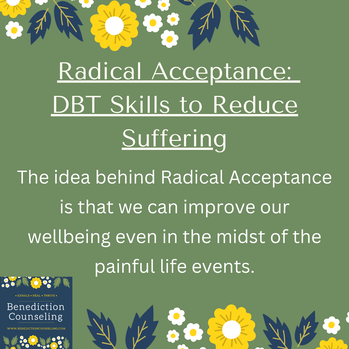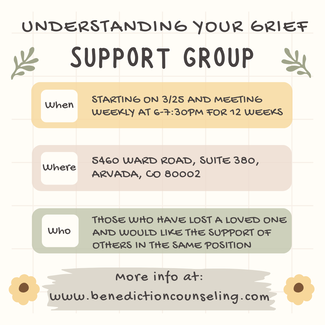Introducing Radical Acceptance Radical Acceptance is a core skill in Dialectical Behavior Therapy (DBT). This skill falls into the category of Distress Tolerance skills. We reach for this skill when we are navigating something big and hard in our life that is outside of our control or influence. The idea behind Radical Acceptance is that we can work to improve our wellbeing even in the midst of the big and hard things. To appreciate what Radical Acceptance can offer us, we must first understand the difference between pain and suffering. Pain is an inevitable part of being human in our world. We will all experience pain at different times in our life. Suffering, however, is caused when we make choices that make painful circumstances harder for ourselves. Radical Acceptance seeks to accept pain and reduce suffering. When we reduce suffering, we grow in emotional resilience and wellbeing. Understanding Radical Acceptance Radical Acceptance is the act of fully acknowledging and embracing reality without judgment or resistance. In other words, Radical Acceptance is a choice to stop fighting against reality. Likely something is happening in our life that is hard and beyond our ability to change it, and we are left with the decision to accept (radically) or reject the reality of the situation. The radical part of Radical Acceptance speaks to the complete and total nature of our choice to accept reality. Radical Acceptance is not resignation or apathy, rather it is a conscious choice to yield to what is real. Radical Acceptance also does not require our stamp of approval on the difficult circumstances, instead a simple acknowledgement that it exists and that we will stop fighting against it. Suffering comes when we fight against painful events that we don’t have the power to change, and Radical Acceptance offers us a peaceful alternative. Cultivating Radical Acceptance DBT offers us some step-by-step guidance on how to execute the choice to Radically Accept painful circumstances.
We can draw upon other DBT skills as tools to help us in this process. Mindfulness skills help us notice what is happening internally and externally and bring awareness to the present moment. Additionally, mindfulness skills call us to self-compassion and nonjudgmental observation of emotions. We may have an opportunity to reframe negative thoughts about our reality and notice growth opportunities or unexpected benefits. Some nourishing activities like journaling and spending time in nature can help promote acceptance. Often times, Radical Acceptance requires patience and practice, as most painful events will require us to choose acceptance over and over again. Disclaimer: Radical Acceptance is not an excuse for harmful or abusive dynamics, but it may be a starting point for being honest about the harm that exists. May this honesty open doors for healing and support.
0 Comments
Losing loved ones is an inevitable part of living as a human. The times surrounding a loved one’s death can be the most challenging seasons in our lives. Even though loss is a universal human experience, people who are grieving often feel alone and isolated because it seems like no one understands what they are going through. Having a supportive community can provide comfort, solace and opportunities for healing. Finding a grief-oriented community can maximize healing opportunities. Grieving and healing in community is an ancient practice.Grieving and healing in community is an ancient practice. Before the rise of individual achievement focused societal structures, there were community gathering places and multigenerational homes where people knew how to hold other’s grief. Grief begins healing when it is externalized. We call this expression of grief mourning. We also know that healing happens when our suffering is witnessed and received by a compassionate party. Perhaps more than any other condition, a community of compassionate and understanding witnesses can unlock the power of healing for those who are grieving. We believe that healing in community happens by both hearing and being heard.We believe that community offers opportunities to heal by both hearing and being heard. When we resonate with the stories others are telling, we learn that we are not alone. Sometimes community members verbalize a part of our own experience we haven’t been able to speak about yet. When we are able to see ourselves in another’s story, we are bolstered by the togetherness we find in our common experiences. We also heal when we are able to share our own story in the safety of a group who will hold our experiences with tender compassion. We believe in the power of story-telling; that when we speak of our internal experiences, we are empowered to metabolize and release the pain. And when our sharing is witnessed in a caring and understanding way, we are more able to accept our painful circumstances. When the bereaved are able to give and receive in these ways, the strength of the group can carry all forward in healing. We invite all those who are navigating the grief related to the loss of a loved one to join our next Understanding Your Grief Support Group. More information can be found HERE. Written by Christian Swan on July 30, 2017
Last night, I had the opportunity to watch the Colorado Symphony perform the score from Harry Potter and the Chamber of Secrets while the movie itself played behind them. It was a really fun night out with my sister-in-law, as we both love the Harry Potter series and also gained appreciation for the stunning John Williams score. As I reflect on the movie today, there is one line that continues to repeat in my head. At the end of Harry's confrontation with Lord Voldemort, Ginny Weasley is revived and Harry Potter's basilisk injury is healed. Harry looks up at Ginny and says "It's alright Ginny, It's over. It's just a memory." Harry and Ginny have just suffered immense traumas that included actual threat to their lives, and yet in this moment, the traumatic memory is consolidated. Harry recognizes that he is safe, and that the events will now only exist in a memory in his mind. The memory remains, but it has no power over him. In one line, Harry Potter summarized the goal of trauma therapy: successful recognition of one's safety. As many of us know, recognizing that you are safe after experiencing trauma is much easier said than done. Sure, you may have the cognitive realization that you are no longer in danger, but the nervous system often operates as if the trauma is ongoing. This sense of ongoing trauma manifests itself in the form of post-traumatic symptoms such as sleeplessness, panic attacks, flashbacks, irritability, fearfulness, or compulsive behavior. The goal of trauma therapy, then, is not only to know on a cognitive level that one is safe, but to develop coping skills around the post-traumatic symptoms so that the nervous system can start signaling that one is truly safe. Each individual heals from trauma differently. Some, like our friend Harry Potter, may integrate the traumatic story more quickly. However, others may continue to suffer from post-traumatic symptoms for months or years after the traumatic event. Where are you in your healing from trauma? Perhaps you have achieved complete healing and can say confidently, "This event happened to me and is part of my story, but it is now only a memory." Perhaps you are experiencing some of the symptoms I mentioned above. It's also possible that you fall somewhere in the middle. Some traumatized individuals may function at a high level, while frequently feeling blindsided by irritability, anxiety, or memories of the traumatic event. If you are considering whether or not you might pursue counseling for your trauma, I encourage you to think back on the event and try Harry's statement: "it's alright; it's over; it's just a memory." How does that sit with you? Are you able to believe yourself, visiting the memory from a distance, or do thoughts of the event trigger anxiety and fearfulness? If you responded with the latter, I want you to know that there is hope, and that you don't have to live a life haunted by your trauma. With counseling, you can begin the healing work of returning to a safe place not only in the world, but also within your own body. Written by Allison Harvey
Trauma survivors have gone through something that challenged every part of them, most significantly their sense of safety. Their needs are personal, unique to their personality and circumstances, and often quite delicate. Naming these needs creates space for trauma survivors to feel safe, work toward healing and maintain connection with loved ones. Physical Needs On a very basic level, trauma survivors have a need for safety and security. Through their traumatic incident(s), they learned to be on guard and watchful. Trauma survivors need a physical location where they can let their guard down and rest. Trauma survivors also need access to medical and psychological care—professionals to come alongside them and nurture their physical and emotional self back to health. Trauma survivors also need adequate nutrition and sleep. Tending to these basic needs helps to heal a nervous system that felt a strong lack of safety. Emotional Needs Those who have survived trauma(s) have a strong need for emotional understanding, empathy and validation. When they are ready to share about their story, they need to be received with compassion, support and validation that says “what you are feeling makes sense to me.” Trauma survivors can also be supported with emotional skills that help them navigate trauma triggers and a large emotional burden while they are healing. Social Needs Trauma healing happens within a safe, understanding and supportive relationship(s). Those who have survived trauma need their people to remain open to them. Trauma healing can be messy and indirect, so survivors need compassion and grace to learn to feel safe in relationships again. Survivors may need more accommodations so that they can stay regulated, and this may look like them setting boundaries or asking for certain changes. Connecting with others who are healing from trauma can be very beneficial as well. Psychological Needs Professionals who are supporting trauma survivors should be trauma-informed and have a path toward healing in mind. Psychological care should be gentle and paced by the survivor. Professionals should respect the trauma survivor’s wishes to tell their story or not, knowing that healing can happen either way. Trauma survivors benefit greatly from learning and practicing coping mechanisms and stress management techniques. All of these activities support the survivor to rebuild trust, regain resilience and personal strength. |
Archives
July 2024
Categories
All
|


 RSS Feed
RSS Feed